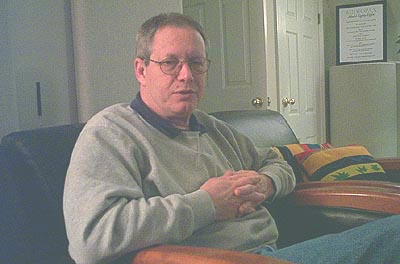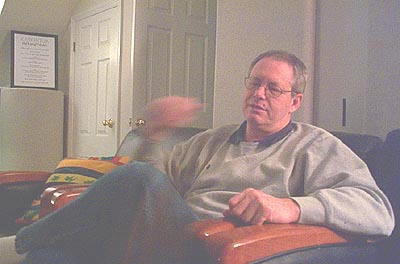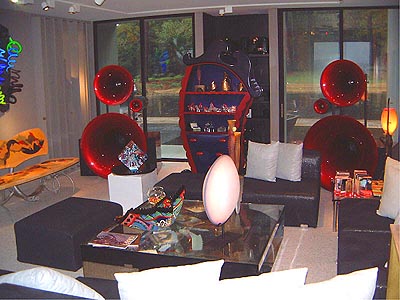 |
|||||||||||||
| Well, let's really get derailed and wreck that VTA. Let's explore your notion that HighEnd audio isn't just peacefully dying of old age and exhaustion. That we're actively killing it. | |||||||||||||
| (Clears his throat.) I can raise my hand, as one of those who helped do it. It's the 80s. I'm running my HighEnd shop Audition in Birmingham/Alabama. We're extremely well-known. We rank as one of the top audio spots in the country. If you've never seen us, we were the biggest Goldmund dealer in the world. We scored as one of a handful of top Quad dealers. We were -- of all things -- one of the top Bang & Olufsen dealers in the US. Recall that B&O was one of the pioneers of the multi-room remote control systems. We'd been that told those were the future of High-End. During that period -- late 80s -- all of us HighEnd guys had somewhat specialized in our lineups. I sold Goldmund, specifically their large speakers, amps and turntable. With arm and cartridge, the latter pegged the needle slightly north of $40,000. At a time when CDs were on the rise and everyone predicted the pending downfall of vinyl! (Chuckles.) I don't know how a Goldmund would compare to a present-day Rockport. At the time, it was a very serious contender. Perhaps the best. And I sold lots of them, to all these diehard 2-channel clients who were really into music. Meanwhile, all the gurus and pundits of the industry were telling us the good news. If you wanted to remain in the game, stay successful, you had to make the transition - from 2-channel to multi-channel multi-room sound. You needed to do lighting control, security, video surveillance, the works. People who I had great respect for insisted that this was going to be our next level of growth. So we took the training and certifications and did all that. Frankly, a lot of my salespeople who weren't as heavily into 2-channel audio to begin with embraced this new credo with a vengeance. Remember, those were big ticket items. Salesmen love big ticket sales. Can't really blame 'em! |
|||||||||||||
 |
Now here's my problem with multi-room audio. In general -- and I sold really high-end systems so performance wasn't the issue -- in general these particular clients were buying a luxury commodity. One customer had heard that I was the guy -- the man -- to buy from. He was a surgeon, referred to me by fellow doctors in the same practice who were hard-core music lovers and long-term clients. So he came wanting my "signature" High-End system. How much would that cost? |
||||||||||||
I was dumbfounded. We hadn't even listened to anything yet. Never mind. Here he says "I ain't got time. What's your best system. How much?" Priding myself on professional service, I still pushed hard to at least see his place before I'd take his money for my very best system. No can do. In essence, he had no time for romance. Just hand me the bill. So I did. I sold him my best system including a fully tricked-out Goldmund turntable and, since he insisted on cassette, the big Nakamichi that was the reference standard of the time. He never let me show him how to use any of this - as though my concern over it was actually bothering him. When I came out to voice his system, he wasn't there. And I'm sorry to say but he never "got" it. Frankly, I wonder whether he ever used it. It was simply putting the SubZero refrigerator here, the Ming vase there, the HighEnd stereo over there. A mere acquisition. A trophy of sorts. He unwittingly introduced me to this whole concept of viewing your music system as a mere appliance - a refrigerator with sound, a cappucchino maker with fancy lights. To some extent, the people who are purchasing these multi-room systems are into acquisitions. It's part of their homes. The black granite kitchen counters. The sunken-in Jaccuzzi bath. The exercise room. The stereo. They do not emotionally, passionately, connect with their music systems. They just have 'em. When they replace a remote or forget how to operate the keypad, they soon forget to play it at all. It's like you and I forget a worn-out pair of shoes in the garage. Unless it gets muddy enough outdoors and we really need to bring out the trash, we'd never go looking for it again. What a departure from our original focus! (Shakes his head.) You see, we first taught people about one room that had good sound - the music room... |
|||||||||||||
| I know exactly what's coming. It's the difference between deliberate immersion and subconscious fly swatting. On the one hand, you purchase a ticket - to the opera, the symphony, the rock arena. You get all psyched up. It's a very special occasion. You really bring yourself wholeheartedly to the event. On the other hand, you simply flick a switch because it's there. You fill the pervasive silence of your home while you cut the tomatoes, read the paper or look over your children's homework. The concert is nourishing. It facilitates a deep emotional communion. The background music's mere noise pollution. |
|||||||||||||
| It's a little bit like wondering whether Miles Davis played that tune so you could fix breakfast. I couldn't be sure, of course. But I'm willing to bet he'd be offended knowing you're sitting there playing with the dog -- or whatever you were doing -- while he's blowing his heart and soul out as though it was the first and last session he'd ever give. It's like brushing your teeth while someone tells you very affectionately how much they truly love you. |
 |
||||||||||||
Wouldn't you be offended if that happened to you? So I soon understood that these people who were into multi-room sound, in general, regarded it as a commodity. They never emotionally connected with our products. And that's okay. After all, we were in the business. It served the purpose of furnishing these clients with what they -- and we, at the time -- thought they needed. But I don't believe that it put music into their lives. It put what I would consider a real bother into their homes. Let me explain. Most earlier musicians and composers, at the time of performance or creation of the score, were ferociously intense about what they were doing. Not in their worst nightmare would they have imagined that people would put their performances on record, to play them back at the most inopportune of distracted moments, there in their homes like some sonic wallpaper piped into Macy's muzak elevators. A lot of people have lost the intimate knowledge of what music could mean in their lives. Perhaps they never had it. Perhaps it slowly faded. They hear it all the time and consider it nothing special. It's become commonplace. It's nibbling on food all day long. It spoils your true hunger, your ability to completely savor a meal made with great dedication, great passion, great expertise. The whole impact has been diluted, cheapened to the point that when you do go out to a restaurant, you're wishing for a gun so you could shoot down that li'l obnoxious speaker squawking away in the background. You don't like it. You don't want it. First off, it's probably not music you'd ever play. But more importantly, you didn't go there to listen to music. You went there to eat. Multi-room, for the most part, does not serve hard-core music lovers. Those who have it installed probably have their whole notion about music skewed. They've never come to recognize music for the therapeutic tool it was meant to be, for the healing art it could and should become in all of our lives. So this idea arose that music had to be accessible 24 hours a day, round-the-clock like a shallow little itch you could conveniently scratch at a moment's notice. We had compression in broadcasts and LPs - we lost the emotional context of musical communion... (Momentarily drifts off into deep thought.) |
|||||||||||||
 |
But let's get back to how we lost that. Everyone says High-End's dying. I don't disagree with that. However, I do question who's really killing it. I go back to about 1990, to an incident I remember as vividly as though it had happened yesterday. A client comes down the hall into our High-End soundroom. He wants to talk to me about a new cartridge for his Goldmund turntable. He's one of my old customers. Not only does he love music -- I'd see him at the concerts we'd be recording; today I'd say his LP collections is upwards of 12,000 -- he's become a friend. He's the perfect example. | ||||||||||||
|
|
|||||||||||||
Here he's come in to see me unannounced, through the backdoor as all my familiar customers would. Meanwhile I'm rushing around like mad. I've got my tape measure in my pocket, my notepad and blueprints on me all in a big hurry to reach the latest jobsite. In short, I'm storming down the hall under great pressure. And there he is. "Hey Jim, where ya goin'? I want to talk to you. I think it's time I did something about my turntable." Now the cash register goes off in my head. His new cartridge will probably set him back $2,500 to $3,000. I always insist on personal setup, alignment and a complete system revoicing. So add 7 to 8 hours of my time. But why bother right now? I've got that shrewd little calculator whispering on my shoulder. I've got a $30 to $40K multi-room install to close. And I may just add that small adjunct media room to the whole project. Here he comes down the hall, a man who got it, who gets it, who lives and breathes it. He sends me customers. He's my friend for crying out loud. And he's standing there looking at me. I'm the guy who got him into all this in the first place. For my professed love of music. For how music can transform our lives if we just create the proper conditions for it. And I blow him off. "I'll give you a call when I come back. I can't do it right now. The builders are waiting, the client's due for an important meeting elsewhere, I've gotta run and get out to this jobsite." And as I start walking away, he quietly wonders "Jimmy, why are you doing this?" I never forgot that, his innocent surprise. "Why are you doing this, Jim?" In hindsight, I appreciate the real depth his innocuous question aimed at - far more than I was able to in the moment. Then I just shrugged it off. And a lot of people in our industry shrug off their clients just as I did. They've developed these personal relationships over years. These customers have tested them on many occasions. If you've never failed them, they now trust you implicitly. They're loyal. They don't shop anywhere else. Instead, they're willing to muscle up to the plate time and again, to spend more money with you and have their musical enjoyment taken to the next level. But what do we do? We rush right past these people, to install some expensive commodity trophy in somebody else's home who, when everything's said and done, probably couldn't care less. Or surely cares less than any of your diehard music lovers would by a substantial margin. So it's really simple. I know that I abandoned my customers. They didn't abandon me. I abandoned them. All these people - and there were many more who didn't stop me in my fast tracks by asking what I was up to ... there was this look on their faces. They didn't have to say anything. I just knew. Still, I made a cold-hearted business decision. This was the way of the future. Even if that meant alienating a customer who would -- depending on the particular year and what he was looking to accomplish -- sometimes spend thousands of dollars with me annually. He'd outfit a new lake house; upgrade his speaker system; bring in new clients like bright neon bill boards. All you had to do was stand there. Be nice to the guy he'd introduce you to, do the right thing. Another no-brainer sale. Of course I'd always feel doubly obliged, to do an excellent job for a fellow who had just stuck his neck way out to create such an unconditional referral. But remember - those people brought you referrals because they had a passion for what you were trying to do. They wanted their friends to have it, too. You never had a passionate referral for a multi-room system. That just never happened, period. Occassionally somebody would attend a party and ask "where did you get this?" But those were simple shoppers - calculating trophy hunters, not souls on fire. Not like the referral people. They were the real deal. And they would grow into customers for life. But guess what? This passionate referral business, in general, does not exist with home theater and custom. It doesn't exist. So when we say High-End audio is dying, it's because the industy, its dealers, have rushed headlong away from their original core audience who stands there now with a lost look in their faces - as though you were leaving them behind in the dust for some more important destination. That's what's happened. We've undermined the faith we've worked so hard to create in the first place. We've preached the heart of music but finally delivered something without soul. I firmly believe that's the reason why High-End is dying. People still have a desire, a hunger. I know. I see it in each and every visitor who comes to Atlanta. But as an industry in general -- and I'm not talking about rare exceptions here and there -- we don't nurture it. You know, I finally realized that if I was going to work in somebody's house as an installer, I really ought to become a plumber. Why should I put these dinky speakers in ceilings? If you were going to be a contractor pursuing the real money, why not be a plumber, an electrician or a custom kitchen cabinetmaker? For me, it eventually boiled down to this. Sure, there was an art in doing proper custom installs; in thinking about where to put the speakers; where they'd sound best; how the client was apt to use the system over time; to anticipate his future expansions; to design smart custom interfaces around it. That was fun to a point. But in the final analysis, it did not enhance the customer's life. It did not add meaning. Granted, It might have made their lives a bit more convenient, a bit more comfortable. But it never made a difference in how they felt day-in, day-out. It didn't pluck their heart strings. It never affected their spirit. Have you ever seen those catalogues - Sharper Image, FrontGate, Herrington? Pens that write underwater, military watches for civilians, unbelievably sophisticated technological marvels ... but gizmos that, when you begin to think about how and whether you'd used 'em, soon loose all their charm and attraction? On a whole, they don't truly provide a meaningful function in your life. They're more like the things you give to someone who already has everything. And that's how I began to feel about these custom installs. They were elaborate and expensive gizmos, truly at the cutting-edge of technology. But they didn't fulfill a real need, they didn't truly enhance the quality of people's lives. [End of Part I.] |
|||||||||||||
 |
|||||||||||||
 |
|||||||||||||
| Return to industry features for Part II. |
Avantgarde-USA website
|
||||||||||||
 |
|||||||||||||